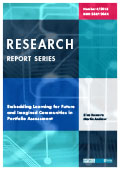 In tertiary contexts where adults study writing for future academic purposes, teaching and learning via portfolio provides them with multiple opportunities to create and recreate texts characteristic of their future and imagined discourse communities. This paper discusses the value of portfolios as vehicles for rehearsing membership of what Benedict Anderson (1983) called “imagined communities”, a concept applied by such scholars as Yasuko Kanno and Bonny Norton (2003). Portfolios can achieve this process
In tertiary contexts where adults study writing for future academic purposes, teaching and learning via portfolio provides them with multiple opportunities to create and recreate texts characteristic of their future and imagined discourse communities. This paper discusses the value of portfolios as vehicles for rehearsing membership of what Benedict Anderson (1983) called “imagined communities”, a concept applied by such scholars as Yasuko Kanno and Bonny Norton (2003). Portfolios can achieve this process
of apprenticeship to a specialist discourse through reproducing texts similar to the authentic artefacts of those discourse communities (Flowerdew, 2000; Hyland, 2003, 2004). We consider the value of multi-drafting, where learners reflect on the learning of a text type characteristic of the students’ future imagined community. We explore Hamp-Lyons and Condon’s belief (2000) that portfolios “critically engage students and teachers in continual discussion, analysis and evaluation of their processes and progress as writers, as reflected in multiple written products” (p.15). Introduced by a discussion of how theoretical perspectives on learning and assessing writing engage with portfolio production, the study presented here outlines a situated pedagogical approach, where students report on their improvement across three portfolio drafts and assess their learning reflectively. A multicultural group of 41 learners enrolled in the degree-level course Academic Writing [AW] at a tertiary institution in New Zealand took part in a study reflecting on this approach to building awareness of one’s own writing. Focus group interviews with a researcher at the final stage of the programme provided qualitative data, which was transcribed and analysed using textual analysis methods (Ryan and Bernard, 2003). Students identified a range of advantages of teaching and learning AW by portfolio. One of the identified benefits was that
the selected text types within the programme were perceived as useful to the students’ immediate futures. This careful choice of target genre was reflected in the overall value of the programme for these learners.
Romova, Z. and Andrew, M. (2015). Embedding learning for future and imagined communities in portfolio assessment. Unitec ePress Research Report Series (4).
https://doi.org/10.34074/rsrp.42015
About this series:
Unitec ePress periodically publishes research report papers that highlight findings of completed research projects by current members of staff and their research associates. All papers are blind reviewed. For more papers in this series please visit: www.unitec.ac.nz/epress/index.php/category/publications/epress-series/research-reports-epress-series/